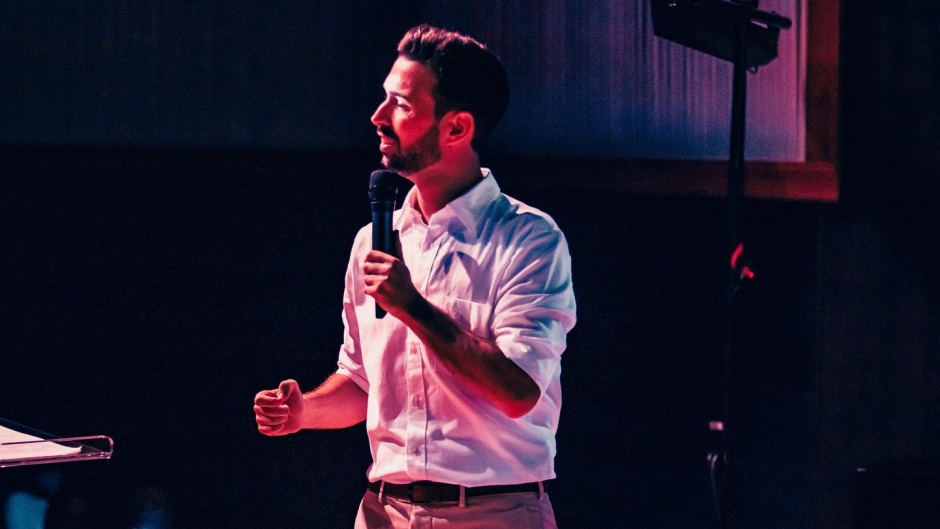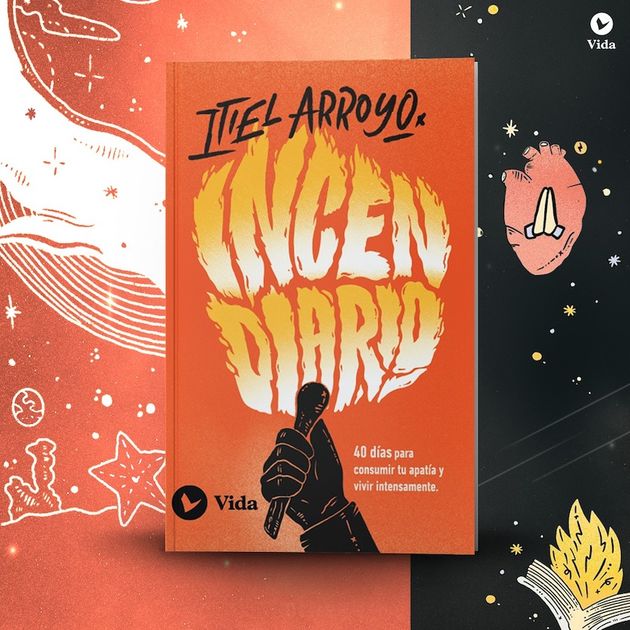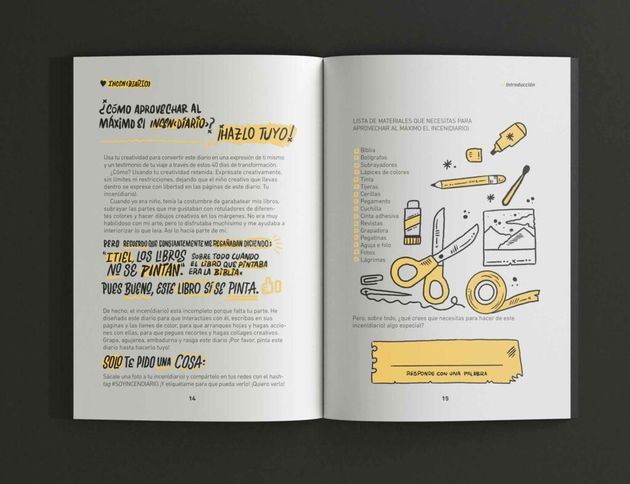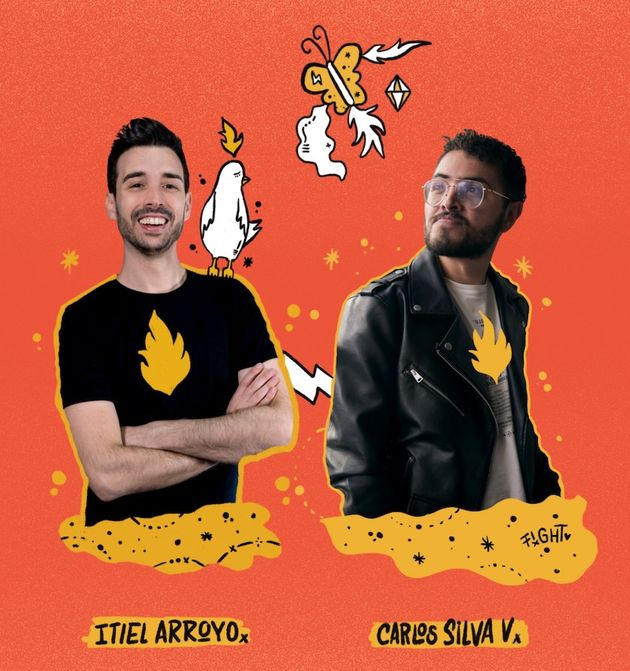Spanish preacher and author Itiel Arroyo: “There is passion wasted in Netflix marathons, playing video games... But God created us for something more transcendent than that”.
 Spanish preacher and author Itiel Arroyo. / Facebook Itiel Arroyo.
Spanish preacher and author Itiel Arroyo. / Facebook Itiel Arroyo.
In a world where apathy and cynicism are growing, and also affecting the lives of Christians, Spanish preacher and author Itiel Arroyo shares a passioante message through his new book, Incendiario: 40 días para consumir tu apatía y vivir intensamente (Incendiary: 40 days to burn your apathy and live intensely).
Arroyo has been preaching to young and old in Spain and Latin America for several years, in large conferences and has always had an intense presence on social media.
In this book, he not only proposes a reading, but a 40-day interaction that leads people to make decisions in order to change their focus and move from a cold to a burning life.
The book-diary, which features illustrations by Carlos Silva, is now available for sale on digital platforms and bookstores.
Spanish news website Protestante Digital interviewed Itiel about the need to refocus the spiritual life in order to find God's true purpose, and take action with compassion and mercy.
Question. Why did you write ‘Incendiary’?
Answer. Basically because of two impulses. First, over the years, working in youth ministry, talking to pastors, parents and leaders, I have had the same assessment of our generation. Sadly, they said: “they lack passion”.
I correct that, because I don't believe that this generation lacks passion, but rather that that passion is misdirected. Instead of focusing on the eternal, we get lost in the most absurd things, especially in this age of entertainment.
There is passion wasted in Netflix marathons, playing video games, collecting funkos... I'm not saying those things are wrong, but I believe God created us for something more transcendent than that.
When all those pastors, over and over again, told me about this lack of passion, I was building in my soul the need to create something that would help refocus the passion on Jesus and His kingdom.
The second reason was that when the publisher contacted me to propose I write a book, we were in a pandemic, and I was experiencing a moment of apathy in my life.
For me, the pandemic meant a halt to all the whirlwind of events, commitments, travel, projects that defined my day-to-day life. Unwittingly, people like me often tend to put their identity in what they do, rather than in a relationship they have.
And I believe God wanted to address that with me, and refocus my heart, not on projects, but on God Himself. I felt then as if something had been stolen from me, because I wasn't being able to do what I was doing, and I felt sad, discouraged, and powerless.
The publisher invited me to write a book with my essence in it. They told me that they saw me as someone who was passionate about what he was doing. And I thought: “you are coming at the worst moment of my life, because I feel apathetic, without desire”. Something deep was going on in my heart: it was a crisis.
Then God spoke to me to tell me that it was really the best time to write it, because God wanted to lead me to discover what it is to live a passionate life.
God said to me, “I want to take you to the essence of passion, which is found in connecting with me. And I'm going to take you on a journey of personal revival”. God wanted to take my ashes and turn them into fire.
And so it happened: as I was writing, I remembered what gives meaning to my life, which is not events, projects or a full agenda, but God Himself and His kingdom, and the purposes that are in my daily life. It was healing for me, and I have put it out there so that it will be healing for anyone who reads it.

Q. In the book you propose a 40-day journey, something that recalls the situations of several biblical characters, including Jesus, who spent 40 days in the desert. Do you expect people, rather than reading a book, to see it as a life experience?
A. I want it to be like a personal diary for the burning of the soul, to rekindle the fire of passion for God in us.
It wasn't my plan to do it that way, but as I was writing it, I realised that taking the reader through a 40-day experience was appropriate.
Anyone who has read the Bible will realise the relevance of the 40 days, which meant encounters with God, times of restating, repentance, healing....
I also wanted it to be an opportunity for the reader to commit 40 days of his life for an encounter with God. It is not a book that you read, but also a diary with which you interact and that you create.
You have to write, paint, tear out pages, and I even give you exercises and missions. I think we have to overcome apathy, which is a lack of sensitivity and a lack of action.
I would like those who read it to recover their lost sensitivity to who God is, but I also want to push them to do things that will help them.
Our faith is a very active faith, Jesus invites us to be compassionate and merciful, to be sensitive to what is going on around us and to do something. The aim of the book is for readers to experience again a sense of God and His purposes and to do something with it.
Q. Feelings are important in our society today, is there a lack of focus in Christians not seeking to fill our senses with God but with other things?
A. I will make a nuance. I come from an ecclesial context where it is insisted that a Christian must be guided by truth, stressing the importance of the mind and perhaps somewhat neglecting the heart.
We are guided by the truth, and not so much by what we may feel. A truth that can be reasoned out and that we believe because we have faith.
But when I look at the life of Jesus, I find a very sensitive person. He was a man who felt mercy and compassion for the people around Him. He had pure, holy feelings, aligned with the heart of God. And those feelings urged Him to bring justice, hope, freedom, and healing....
I think we cannot demonise feelings as something bad, but redeem them, sanctify them. Feelings are very powerful. What I would like is that by reading the book we sanctify that feeling and awaken the illusion to say: “yes, it is worth living a passionate life for God”.

[photo_footer] Each day the book proposes a series of readings, reflections and challenges to carry out. [/photo_footer]
And that that feeling leads us to action, as it was in the life of Jesus. Passion for God engages us with a suffering world. I begin by talking about God, about His heart and what God wants to do in ours, but I finish by talking about mission, what God expects us to do in the world.
I believe that this corrupt world is trying to capture our emotions, and it does it in very subtle ways. It has managed to capture our attention through social media, stealing our sensibility.
We are constantly exposed to so much stimulation, through social media, videos, music, that we live distracted lives. It is as if we lose focus and are unable to find the silence to listen to the voice of God, who is calling us to Him.
I would like that, with this book, in those 40 days, the reader can commit to fasting, to limit everything that is draining their attention so that they can focus on God and His purposes.
I use the word fasting because it is meaningful: it is saying “no” to things that are junk food, and seeking the wholesome food that we find in God, in the Word and in His presence.
Q. Today there are so many offers around us, and perhaps we are not prepared to process them properly. Do we live in a world of over-entertainment and distractions?
A. We don't realise it, but in this digital age, algorithms are designed to keep us connected for as long as possible. But not to make us grow in knowledge, wisdom or intelligence, but to entertain us.
Entertainment is a thief of our purpose. Furthermore, the stimuli come mixed. When you slide on your mobile phone, on any social media, in one minute you can see a picture of kittens, a dance, the disgrace of a massacre in Africa, and a meme.
Our brain ends up believing that those things are all in the same category. We are sacrificingour sensitivity, without realising it . We lose the chance to have sanctified feelings, which God wants us to experience. God feels: happiness, peace, love... And He wants us to feel what He feels.
Too much entertainment is stealing our sensitivity, making us apathetic, making us lose our heart in the process. With this book I would like them to experience the fasting from excess and reconnect with the God who is calling them to live a life much bigger than slide on Instagram.
We sacrifice our own life when we procrastinate. The most important thing is the time God has given us. It is sad to spend your life looking at pictures of what others are doing, which most of the time are lies, and miss out your own life.
I write it in the book: distracted living leads you to lose your daughter, your wife, your friends, by not living in the present. They are all around us, but if we are distracted, we miss them. It's a drama.

Q. In a society with so many options for connecting, why do we seem to be the generation with the greatest loneliness issues?
A. In this hyper-connected virtual world, we feel more lonely and isolated than ever before. God designed us with the need to connect with Him and those around us. Virtual connection is a fix, but it will never replace real connection, seeing each other and being together.
God designed the church, the community, not as an option, but as a necessity for the whole world. The church is God's social media, which involves being present, together, touching, loving, serving, wrestling, learning, exhorting.
As much as we talk about new ways of doing church in the virtual age, I wouldn't say that consuming preaching on YouTube is doing church. That's information and knowledge consumption... That's fine, I'll even add to that content. But it cannot replace the church.
I call the reader through this book to reconnect with his local space. We live in an era where we are sorry for what we did in the past, feeling guilty, and very anxious about the future, about what we want to become or do.
Between the guilt of the past and the anxiety for the future is the present, the presence of God. God is now, in the present, here. Being aware of His presence is what makes us live happy lives.
When I connect with God, when I recognise that He is with me, I am invited to connect with the important people in my life: with my wife, my daughter, my local church. Not through the screen, but in person, touching each other, serving each other, loving each other.
I believe that whoever returns to live this present, discovers the lost joy.
Marketing always tells us that we are missing something: a product, an experience... In this book I want to awaken people, so that we realise that we already have everything we need, now.
Writing the book, I remembered that I already have what I need, and that my joy is God and what God has already given me, the people around me. Everything else is added.
Q. A fire implies that the blaze spreads. What would you like to see happen with this book?
A. I would love for those who live this experience to share it with others, and to create a movement of people who live passionately for God.
I think passion is very contagious. The programs we are most attracted to on television are those who do things with passion.
That is why I would love for the fire to spread so that we can live on fire as Christians in a world that feels increasingly cold and dark. A church on fire is the most attractive thing there is.
You can find out more about this book on its website, where you can also download a sample of the first chapters for free (in Spanish).
[donate]

Las opiniones vertidas por nuestros colaboradores se realizan a nivel personal, pudiendo coincidir o no con la postura de la dirección de Protestante Digital.
Si quieres comentar o